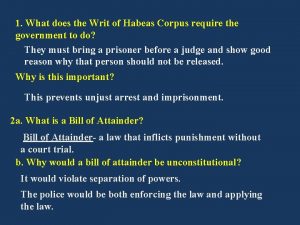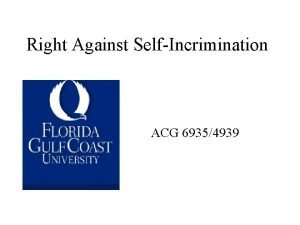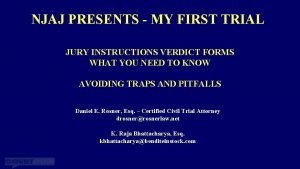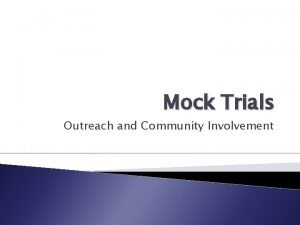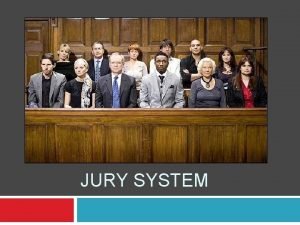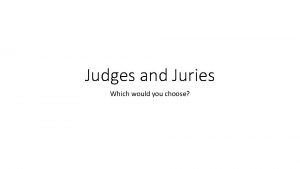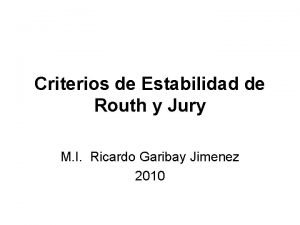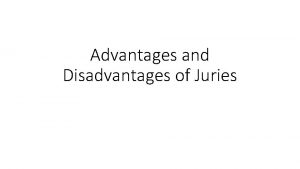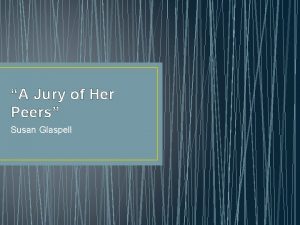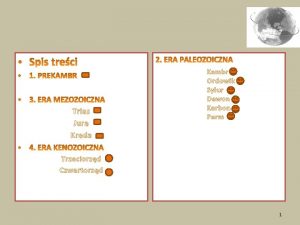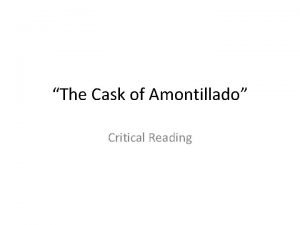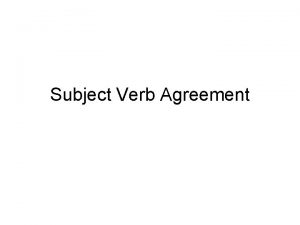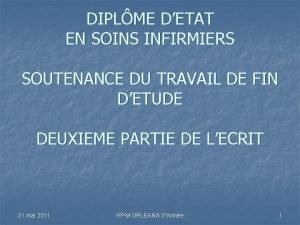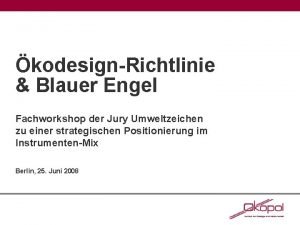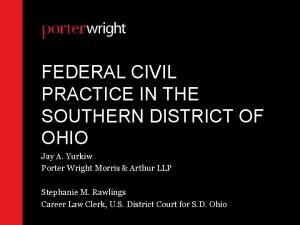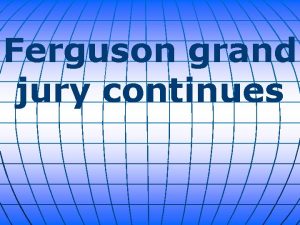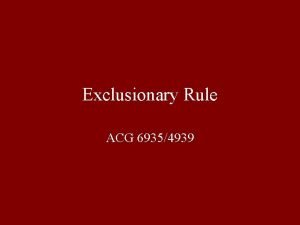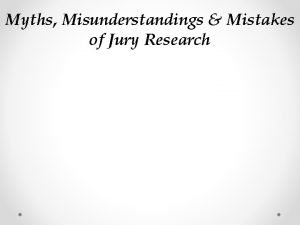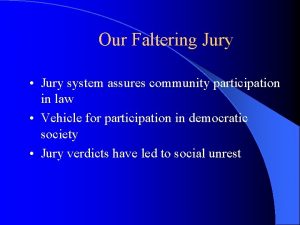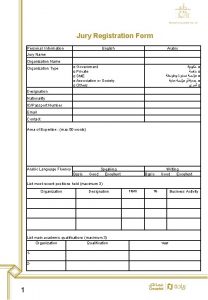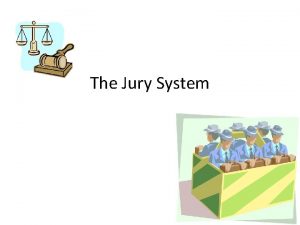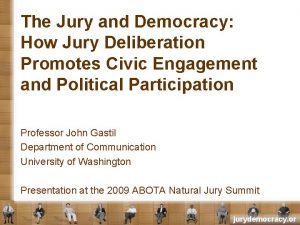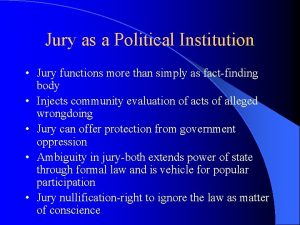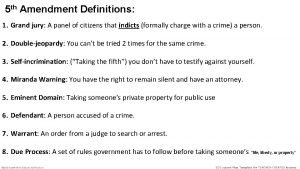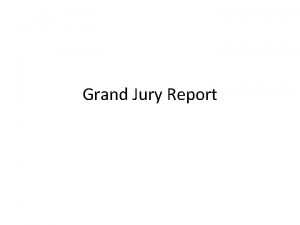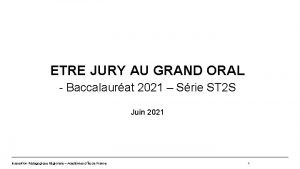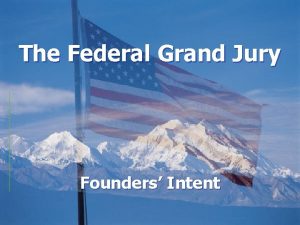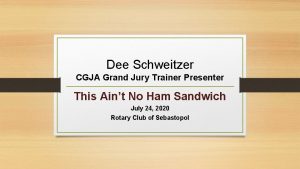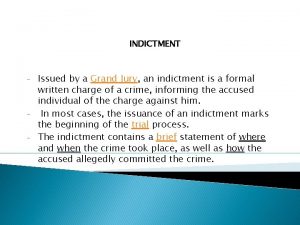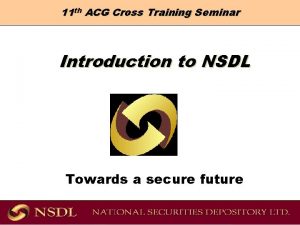Introduction to the Grand Jury ACG 69354939 What

























- Slides: 25

Introduction to the Grand Jury ACG 6935/4939

What in the world is a Grand Jury

A Grand Jury is…. . . • Group of Ordinary Citizens • Consists of 16 to 23 people • Their purpose is review evidence of suspected criminality and • to decide whether criminal charges are warranted • Grand Jury Review required in the 5 th Amendment

Functions of a Grand Jury 1. Investigatory 2. Screening

Investigatory Function • Gather evidence • Summon witnesses • Compelling production of tangible evidence. • Can initiate an investigation on mere suspicion that the law is being violated.

Screening Process • An Independent Voice • Reviews the Evidence • Grand Jurors decide whether to return a “True Bill” or a “No True Bill” • “True Bill” = indictment which is the formal charging of a crime.

Charging Instruments Criminal Complaint Indictment by a Grand Jury Information < 20 Days Guilty Plea Probable Cause Hearing < 30 Days Dismissal Arrest

Standards of Proof • Probable Cause • Prima Facie • Preponderance of the Evidence • Clear and Convincing Evidence • Beyond a Reasonable Doubt

Grand Jury Powers • Subpoena Power • Holds people in contempt of court if they don’t comply • Testimony given under oath • Subpoena is not issued pursuant to a level of judicial proof. (Exception: the subpoena is too sweeping to be considered reasonable)

Immunity • Can gain the testimony of a witnesses who fear prosecution for their part in a crime. • Transactional Immunity • Use/Derivative Use Immunity (Kastigar v. US (S. Ct. 1972)

5 th Amendment The Right Against Self-Incrimination

Does the Fifth Amendment Apply to …. . • • Testimony? Fingerprints? DNA? Hair Samples? Blood Samples? Handwriting? Perjury?

Rights & Procedures

Who Can Be Present in the Grand Jury Room? • • • Prosecutor? Judge? Agents? Defense Attorney? Target of the Investigation? • Stenographer? • Judge?

Prosecutor • Asks questions of the witnesses • Explains the elements of the offense • In some jurisdictions, can offer his/her opinion on the sufficiency of the evidence

Witness • Has to give truthful testimony • Can plead 5 th amendment right • Questioned by prosecutor and grand jurors if they so choose • Can use hearsay testimony

Defendant • Can be subpoenaed to the Grand Jury • Can assert 5 th amendment right • His lawyer can not be present in the grand jury room • Can have attorney outside the room

Grand Jurors • Listen to Testimony • Determine the validity of the evidence • Can demand witnesses to appear • Can Expand the investigation • Can use personal experiences to decide guilt or innocence

The Grand Jury is Secret • Prevent interference by potential defendants • Protect an innocent person’s reputation • Encourage uninhibited disclosure • freedom to consider the case without fear of public pressure or influence • To prevent escape of potential defendants

Who is Bound by the Secrecy Requirement? • • • Prosecutor? Witnesses? Agents? Stenographer? Grand Jurors? Defendants?

Rule 6(e) • Allows disclosure of grand jury evidence. • Disclosure to further the investigation. • Allow other members of the prosecutorial team to view the same evidence.

Challenges to Grand Jury Evidence • Costello v. United States • Court ruled against Costello • The court characterized the grand jury as “a body of laymen, free from technical rules” • Grand Juries are allowed to hear evidence that would be inadmissible at trial. • GJ protects only the factual innocent from having to stand trial

Challenges to Grand Jury Evidence (Cont. ) • United States v. Calandra • Supreme Court refused to extend the exclusionary rule to the Grand Jury • Allows illegally obtained evidence to be presented to the grand jury. • Suppression issues prior to indictment


Advantages/ Disadvantages of a Grand Jury • • • Secrecy Separation of Duties Internal Controls Independence Review by Peers Allows Free Expression • Lack of Legal Training • Too much power for the prosecutor • No chance for cross examination • One sided • Evidence admitted that can’t be used at trial • Lack of Legal Training
 The writ of habeas corpus and the grand jury both
The writ of habeas corpus and the grand jury both Aflp in pregnancy
Aflp in pregnancy Chronic pancreatitis guideline
Chronic pancreatitis guideline Acg
Acg Acg grouper
Acg grouper Njaj
Njaj National research staffing mock jury
National research staffing mock jury Jury vs judge
Jury vs judge Whats a hung jury
Whats a hung jury Jury vs judge
Jury vs judge Estabilidad
Estabilidad Advantages and disadvantages of juries
Advantages and disadvantages of juries Setting of a jury of her peers
Setting of a jury of her peers Heck tate is wise and tolerant
Heck tate is wise and tolerant Jury of executive opinion method
Jury of executive opinion method Jura trias kreda
Jura trias kreda 3 clever things montresor does to lure fortunato
3 clever things montresor does to lure fortunato Neither of my two suitcases is adequate for this trip
Neither of my two suitcases is adequate for this trip Soutenance tfe infirmier
Soutenance tfe infirmier Tom angers mr. gilmer and the jury by
Tom angers mr. gilmer and the jury by Routh criteria
Routh criteria Jury umweltzeichen
Jury umweltzeichen Jury.ohsd.uscourts.gov
Jury.ohsd.uscourts.gov Hình ảnh bộ gõ cơ thể búng tay
Hình ảnh bộ gõ cơ thể búng tay Lp html
Lp html Bổ thể
Bổ thể
